| 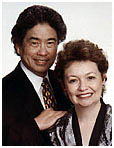 Effective
Teaching...
Effective
Teaching...
by Harry and Rosemary
Wong
May
2006
Hitting the
Bulls Eye as a Beginning Teacher
Many teachers begin
teaching without a clear lesson plan format and without an operational
curriculum in hand. Even fewer receive curricula that are aligned
with state standards. They have to figure out what
to teach and how to teach it. Can you imagine Starbuck’s
telling its employees to figure out how to make coffee without
telling them what bean to use or how to grind the bean?
Or, American Airlines telling its pilots here’s a plane
full of passengers; now get them to Chicago!
The New Pathways to Teaching in New Jersey is
a program for people seeking an alternative route to teaching.
They have been in other professions and now wish to enter the
classroom. One tool they give their teachers in training
is a template to use as a lesson plan format.

Ask Two Questions
Norm Dannen is presently in the New Pathways
program and is currently teaching advanced English at Southern
Regional High School in Manahawkin, New Jersey. His instructor
in the New Pathways program is Tom Vona, who was a teacher, assistant
principal, and principal. Tom also observes Norm in his teaching
setting, so Norm is in good hands.
Norm’s situation is an exception to the rule. It
is rather common for a new teacher to receive no details about
specific content, sequence, instructional materials, or pedagogical
methods. New teachers are recruited by the thousands,
and often few, if any, support systems are put into place to allow
their successful transition into the classroom.
Teachers show up on their first day and are told to go and teach.
The new teacher may not even be walked to the classroom or be
welcomed to the school by the staff.
This would never happen for new employees at any company or non-profit
organization such as Home Depot, The Cheesecake Factory, or the
American Red Cross. New hires would show up on the first
day of work and expect to be trained on how things are done.
Of course, what else?
Therefore, if you are a teacher looking for a job, it
is important that you ask two questions at the interview:
• Is there an induction program?
• Is there a curriculum for my subject(s) or grade level?
If you are not familiar with the term induction program, please
read “Improving
Student Achievement Is Simple, Part 1 and Part
2”.
Next, ask for a copy of the curriculum. Students come to
school to learn and the curriculum describes what the students
are to learn in a subject or at your grade level.
For instance, if you were to work for the Lafourche Parish Public
Schools in Louisiana, you would get a binder for a subject at
your grade level with
A list of the state standards
Lesson objectives that are aligned to the state standards
Suggested activities that teach to the lesson objectives
Sample tests that are aligned to the objectives to use for assessment
More on this can be read at “Applying
For a Teaching Job in a Tight Market, Part 2.”
Start With the End in Mind
The effective teacher starts with the end in mind, with
standards or goals. Perhaps you have heard of this
as the “backward” approach to curricular design as
explained by Grant Wiggins and Jay McTighe in their book, Understanding
by Design.
As we said last month, standards represent a valuable guide post
for you. Standards do not tell you what to teach, how to
teach, or how to assess. They simply give you a base point
from which to start a lesson and serve as a goal when you assess
the success of your efforts in teaching the lesson.
These types of standards are typically generalized and most often
are found as state standards.
New Jersey has some language arts literacy standards, each of
which has lettered strands and learning expectations for each
grade level in grades K-8, as well as a combined cluster for grades
9-12. Here are four of the 9-12 standards.
STANDARD 3.1 (READING) — All students will understand
and apply the knowledge of sounds, letters, and words in written
English to become independent and fluent readers, and will read
a variety of materials and texts with fluency and comprehension.
STANDARD 3.2 (WRITING) — All students will write
in clear, concise, organized language that varies in context
and form for different audiences and purposes.
STANDARD 3.3 (LISTENING) — All students will
listen actively to information from a variety of sources in
a variety of situations.
STANDARD 3.4 (VIEWING AND MEDIA LITERACY) — All
students will access, view, evaluate, and respond to print,
non-print, and electronic texts and resources.
Align Objectives to State Standards
Norm created a 15-day unit to have students interpret The
Great Gatsby artistically, thematically, and historically.
In so doing, students identified with the autobiographical nature
of the novel and applied the moral themes of this American literary
classic to their own development as young adults.
Students achieved these objectives through a close reading of
the novel (in class and aloud, with Study Guide Questions), writing
exercises (Compare and Contrast, character analysis), small group
discussion (analysis of the value of the American Dream as viewed
by Fitzgerald), and critical thinking skills, in accordance with
New Jersey Core Curriculum Standards for Reading, Speaking, Writing,
and Media.
Norm wrote specific objectives that 1) are aligned to
the state standards, and 2) state what students will be able to
do as a result of the lesson.
Lesson Objectives for The Great Gatsby
Draw parallels between their own lives and the life and work
of F. Scott Fitzgerald in the context of the Jazz Age, the Lost
Generation, Prohibition, and the Great Depression.
Describe one significant event each in the artistic, musical,
social, literary, and historical context of the writing of The
Great Gatsby.
Describe at least three autobiographical elements of Fitzgerald’s
own life that are reflected in The Great Gatsby.
Explain narrative Points of View and the importance of Nick
Carraway to the telling of the story.
Describe Fitzgerald’s view of the American Dream, as
defined by character and plot development in The Great Gatsby
and a related short story by Fitzgerald, “Winter Dreams.”
Identify how an author can use elements of Symbolism and Color
in the creation of fictional characters that have greater depth,
meaning, and immediacy.
Write a Fitzgerald-style narrative, creating their own characters
and applying literary elements and events from their own lives.
Objectives are important in the teaching of a lesson.
- Objectives are classroom learning targets. The students
know what they are aiming for, thus, they know what they are
responsible for learning.
- Objectives remove the mystery to students. If they do
not know where they are going, they won’t be able to get
there. So they moan, but rightly so, “Boring!”
- Objectives give students a focus and enable them to check
for their own understanding. They are more likely to know
if they know something or not.
- Students are more likely to buy into the lesson and are more
likely to participate in activities if they understand why they
are doing it.
Thus, communicate your objectives with (not to) your students.
Teachers who set and share objectives for learning can realize
an average percentage gain of 22 on standardized tests.
The quality of the lesson objectives accounts for much of what
we see or do not see in the classroom. (Wise and Okey, 1983
as found in The First Days of School,
p. 214)
The Lesson Activities
Standards and objectives actually improve your creativity.
Use objectives as the bulls eye on a target. As you start
a lesson, write the objective on the board prior to and leave
it there during the entire lesson as the goal.
It also helps that the teacher can point to it as the lesson progresses
and the students know upfront where they re headed.
With the lesson objectives set, the effective teacher can creatively
design activities that are aligned to the objectives. This
is the creative heart of any lesson, the lesson activities.
All activities selected must be directly focused on achieving
the objective and must contribute to students being able to achieve
the stated objective and hit the bulls eye during your assessment
of mastery of the goal.
The creativity comes when you reflect on how you will implement
the standards and objectives. It’s no different from
going to a hair dresser. There are standards of how a hair
salon is operated. How your hair is transformed is all up
to the creativity of the hair stylist, provided nothing is used
or done that will violate a standard and harm the customer.
This is the same in the classroom. Implementation of the
objectives is all up to the teacher.
In the best case scenario, the best lessons are the creative
efforts of the members of a collegial grade level or a content
department with everyone contributing and evaluating the best
ways to enhance student learning.
Each day’s lesson typically begins with a correlated
bell work assignment, a motivator, or something that will focus
the students on the day’s lesson. Thus, start
with a motivator or an attention grabber to engage the students.
In educational terms, this is called an “Anticipatory Set,”
that is something used to get the students set to anticipate the
lesson.
Norm says, “To focus attention on the lesson, I display
an interdisciplinary transparency highlighting an historical element
of the 1920s that is relevant to the story line of The Great
Gatsby at the beginning of each class period.”
To see what activities he used each day, please click
here.
The Students Come to School to Work
The purpose of schooling is for the students to learn
and achieve. For students to learn, they must do
the work. If you go home at the end of the day exhausted,
it may be you are doing all the work and not the students.
Schools are built for the students, not the teachers. See
how Steve Geiman came to this realization.
When people go to work, “work” means to get the work
done. Students are no different. When they come to
school, they all know they are to get the work done, and the better
they do the work, the better the grade they earn.
But, it can be difficult if not impossible for a student
to get the work done when the assignment does not spell out what
the student is to do. There are no standards, no
objectives, and no activities done for a specified reason.
It’s like shooting arrows blindfolded hoping that one will
hit the target.
Poor assignments like
Read chapter 7.
Open your book to page 143.
Do this worksheet.
Watch this video.
Break into groups.
Write a paper on the Byzantine period
add to the confusion and misdirection experienced by students.
Because the students see no reason for the assignments, many
students will blurt out and ask, “Why? why? and why do we
have to do this?”
It basically comes down to what you teach and how you teach it!
You teach for learning, not for coverage. The student’s
incentive is to get better learning; the teacher’s incentive
is to get better results.
| This can be done as follows: |
- Your lesson is aligned to a state or district standard.
- Your lesson has an objective to focus the lesson.
- Your lesson shows what you do to teach the objective.
- You have a test that is used to assess for learning.
|
Therefore, the greater the structure of a lesson and
the more precise the objectives on what is to be accomplished,
the higher the student learning rate.
Setting the Stage for Learning
This month’s column focused on how a teacher, Norm Dannen,
uses objectives to communicate to his students what they are to
learn. In a future column, we will share with you how Norm
Dannen assesses and tests his students on that learning.
Unless you know where you are going, you will never be
able to test if you have arrived at the designated point and hit
the bulls eye.
As you wind up this school year reflect on your past lessons
and identify those that were successful for your students.
For those successful lessons, more than likely you had very specific
learning outcomes in mind and targeted activities that moved your
students toward accomplishment of the goals.
While the summer is meant for you to relax, refresh, and recharge,
we encourage you to use it as a time to reinvent your lessons
and identify and align them with state standards and create targeted
lesson activities aimed at achieving the goal.
Your students next school year will reap the rewards of your
time spent as they achieve more. Your competency as a teacher
will grow as your students continue to gain in testing.
Teaching is so much easier when you know where you are going and
how you’re going to get there.
Have a great summer and an even greater next school year!
 For a printable version of this article click
here.
For a printable version of this article click
here.
Harry & Rosemary Wong products: http://www.harrywong.com/product/
Email Harry Wong: harrywong@teachers.net
Gazette Articles by Harry & Rosemary Wong:
If you spot a link that appears to be out-of-date, please alert us at webmaster@teachers.net!
- A Grateful Goodbye After 15 Years (Jun 2015)
- Love, Marriage, and Babies, Oh My! (May 2015)
- Retention Rate Is 100 Percent (Apr 2015)
- Teacher Effectiveness and Human Capital (Mar 2015)
- Training Teachers to Be Effective (Feb 2015)
- Making Deals Is Ineffective (Dec 2014 / Jan 2015)
- Retrieving and Carrying Electronic Devices (Nov 2014)
- Sharing to Succeed (Oct 2014)
- How a University Prepares Its Students (Sep 2014)
- Effective Teaching (Aug 2014)
- Your Future Is in Your Hands (June/July 2014)
- The Classroom Management Book (May 2014)
- When Students Succeed; Teachers Succeed (April 2014)
- Teaching New Teachers How to Succeed (March 2014)
- Execute and Praise (February 2014)
- Shaping a Solid Foundation (Dec 2013 / Jan 2014)
- The Most Misunderstood Word (November 2013)
- How to Start Class Every Day (October 2013)
- Prevention: The Key to Solving Discipline Problems (September 2013)
- Planning, Planning, Planning (August 2013)
- Are You THE One? (June / July 2013)
- Practical Examples That Work (May 2013)
- A Disability Is Not a Handicap (Apr 2013)
- Totally Inexcusable (Mar 2013)
- Be Proud of Public Education (Feb 2013)
- Structure Will Motivate Students (Dec 2012 / Jan2013)
- Orchestrating the Classroom (Nov 2012)
- The Lasting Impact of Instructional Coaching (Oct 2012)
- Learning, Laughing, and Leaving a Legacy (Sep 2012)
- Twenty-two, First Year, and Legit (Aug 2012)
- A Master Teacher of Teachers (June/July 2012)
- Where Going to School Means Success (May 2012)
- A Nationally Celebrated High School (Apr 2012)
- The Highest Rated School in New York City, Part 2 (Mar 2012)
- The Highest Rated School in New York City, Part 1 (Feb 2012)
- The Importance of Culture (Dec 2011 / Jan 2012)
- You Can Teach Classroom Management (Nov 2011)
- Seamless, Transparent, and Consistent (Oct 2011)
- Coaching Teachers to Be Effective Instructors (Sep 2011)
- How a Principal Creates a Culture of Consistency (Aug 2011)
- Graduation Begins in Your Classroom (June/July 2011)
- The Inspiration of a Mother (May 2011)
- How to Be an Effective Leader (Apr 2011)
- Learning Objectives: The Heart of Every Lesson (Mar 2011)
- Even Shakespeare Had Structure (Feb 2011)
- Effectiveness Defined: It's Not a Mystery (Dec 2010 / Jan 2011)
- Surviving Without a Principal (Nov 2010)
- Achieving Greatness: Locke Elementary School, Part 2 (Oct 2010)
- Teaching Greatness: Locke Elementary School, Part 1 (Sep 2010)
- Effective from the Start (Aug 2010)
- Ten Year Summary of Articles, 2000 to 2010 (June/July 2010)
- The Success of a Culture of Consistency (May 2010)
- Training Teachers to Be Effective (Apr 2010)
- Learning to Teach, Teaching to Learn (Mar 2010)
- Turning Teaching Dreams into Reality (Feb 2010)
- Dreams and Wishes Can Come True (Dec 2009 / Jan 2010)
- Success in a State Controlled School (Nov 2009)
- Inner City Is Not An Excuse (Oct 2009)
- Exceeding All Expectations (Sep 2009)
- Teachers Are the Difference (Aug 2009)
- Nine Year Summary of Articles, 2000 to 2009 (Jun/Jul 2009)
- Teachers Are the Greatest Assets (May 2009)
- The Tools for Success (Apr 2009)
- Assessing for Student Learning (Mar 2009)
- To Be an Effective Teacher Simply Copy and Paste (Feb 2009)
- The Sounds of Students Learning and Performing (Dec 2008)
- A School That Achieves Greatness (Nov 2008)
- Boaz City Schools: Professional Learning Teams (Oct 2008)
- It Was Something Close to a Miracle (Sep 2008)
- A Computer Teacher Shows the Way (Aug 2008)
- Eight Year Summary of Articles, 2000 to 2008 (Jun/Jul 2008)
- An Amazing Kindergarten Teacher (May 2008)
- Schools That Beat the Academic Odds (Apr 2008)
- Academic Coaching Produces More Effective Teachers (Mar 2008)
- Coaches Are More Effective than Mentors (Feb 2008)
- Wrapping the Year with Rap! (Dec 2007/Jan 2008)
- The Floating Teacher (Nov 2007)
- Taking the Bite Out of Assessment—Using Scoring Guides (Oct 2007)
- Ten Timely Tools for Success on the First Days of School (Sep 2007)
- First Day of School Script - in Spanish, Too! (Aug 2007)
- Seven Year Summary of Articles, 2000 to 2007 (Jun 2007)
- Effective Teachers End the Year Successfully (May 2007)
- Training Gen Y Teachers for Maximum Effectiveness (Apr 2007)
- Classroom Management Applies to All Teachers (Mar 2007)
- Students Want a Sense of Direction (Feb 2007)
- Rubrics in Two College Classes (Dec 2006/Jan 2007)
- How to Write a Rubric (Nov 2006)
- Assessing Student Progress with a Rubric (Oct 2006)
- A 92 Percent Homework Turn-in Rate (Sep 2006)
- Effective Teachers Are Proactive (Aug 2006)
- Five Year Summary of Articles (Jun 2006)
- Hitting the Bulls Eye as a Beginning Teacher (May 2006)
- They're Eager to Do the Assignments (Apr 2006)
- The Success of Special Ed Teachers (Mar 2006)
- What Teachers Have Accomplished (Feb 2006)
- Fifty Years Ago, The Legacy (Dec 2005/Jan 2006)
- The Emergency Teacher (Nov 2005)
- Classroom Management Is Not Discipline (Oct 2005)
- A Successful First Day Is No Secret (Sep 2005)
- The Most Important Factor (Aug 2005)
- Four Year Summary of Articles (Jul 2005)
- Improving Student Achievement Is Very Simple (Part 2) (Jun 2005)
- Improving Student Achievement Is Very Simple (Part 1) (May 2005)
- Never Cease to Learn (Apr 2005)
- His Classroom Is a Real Life Office (Mar 2005)
- The Power of Procedures (Feb 2005)
- The First Ten Days of School (Jan 2005)
- PowerPoint Procedures (Nov/Dec 2004)
- The Saints of Education (Oct 2004)
- How Procedures Saved a Teacher's Life (Sep 2004)
- How to Help Students with Their Assignments (Aug 2004)
- Three Year Summary of Articles (Jun/Jul 2004)
- His Students are All Certified (May 2004)
- What to Do When They Complain (Apr 2004)
- A Well-Oiled Learning Machine (Mar 2004)
- The Effective Teacher Adapts (Feb 2004)
- How to Start a Lesson Plan (Aug 2003)
- Applying for a Teaching Job in a Tight Market - Part 2 (Jun/Jul 2003)
- Applying for a Teaching Job in a Tight Market (May 2003)
- The Effective Substitute Teacher (Apr 2003)
- A First Day of School Script (Mar 2003)
- How to Retain New Teachers (Feb 2003)
- No Problem With Hurricane Lili (Dec 2002)
- A Class Size of 500 (Nov 2002)
- Effective Practices Apply to All Teachers (Oct 2002)
- Dispensing Materials in Fifteen Seconds (Sept 2002)
- How To Start School Successfully (Aug 2002)
- Teaching Procedures Is Teaching Expectations (June - July 2002)
- $50,000 to Replace Each Teacher (May 2002)
- Even Superintendents Do It (Apr 2002)
- Impossible, No Job Openings? (Mar 2002)
- A Stress Free Teacher (Feb 2002)
- A Most Effective School (Jan 2002)
- Van Gogh in Nine Hours (Dec 2001)
- The Effective Teacher Thinks (Nov 2001)
- How a Good University Can Help You (Sep 2001)
- How to Motivate Your Students (May 2001)
- How to Recognize Where You Want to Be (Apr 2001)
- What Successful New Teachers Are Taught (Mar 2001)
- A Journey of the Heart (Feb 2001)
- The Miracle of Teachers (Jan 2001)
- It's Not the Students. It's the Teacher. (Dec 2000)
- The First Five Minutes Are Critical (Nov 2000)
- How to Start a Class Effectively (Oct 2000)
- The Problem Is Not Discipline (Sep 2000)
- There Is Only One First Day of School (Aug 2000)
- Applying for Your First Job (Jul 2000)
- Your First Day (Jun 2000)
Browse through the latest posts from the Classroom Management
Chatboard...
|




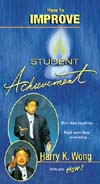
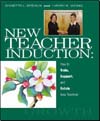
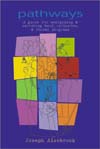


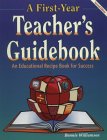
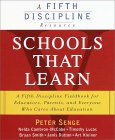

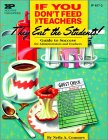
 Effective
Teaching...
Effective
Teaching... 